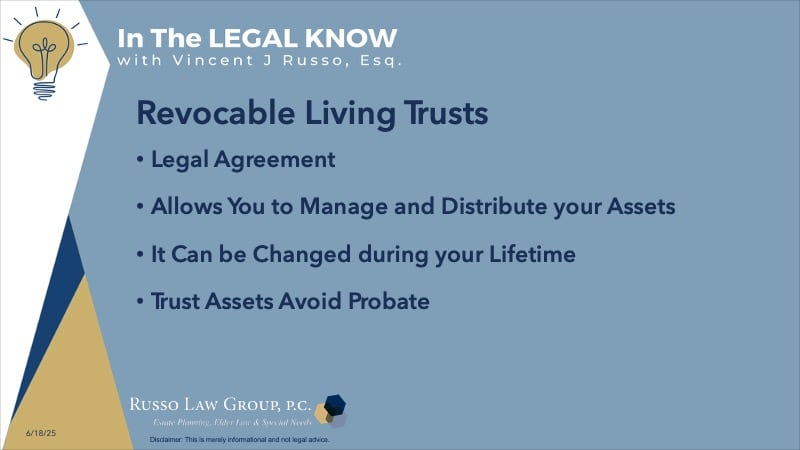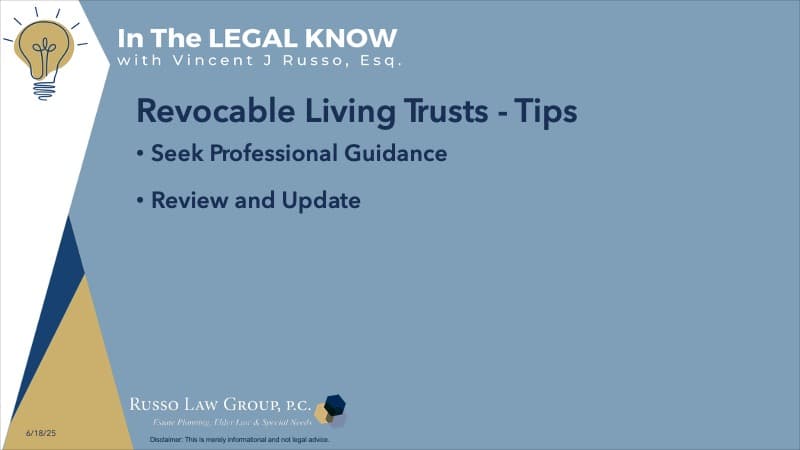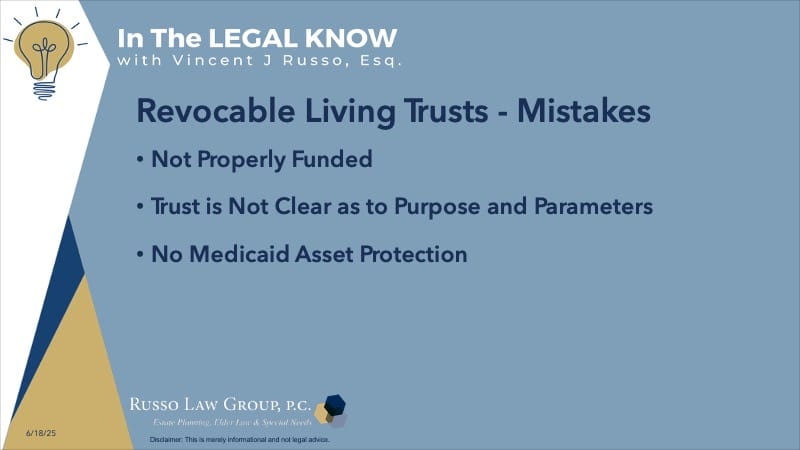Delve into the significance of resolutions, their origins, and actionable advice for making meaningful life improvements this year.
Today, many people are setting up Revocable Living Trusts as part of their estate plan. These trusts can offer several potential benefits, including avoiding probate, maintaining privacy, and providing for incapacity.
However, once established there is more to be done!
This originally aired on the Catholic Faith Network’s show CFN Live: https://youtu.be/_37V4R4aXYo
What is a Revocable Living Trust?
A Revocable Living Trust is a legal document that allows you to manage and distribute your assets while you are alive and after your death.

A Revocable Living Trust can be funded up front and/or in stages. It allows you to transfer ownership of your assets (like property, investments, and bank accounts) into a trust.
With a Revocable Living Trust, you can change or revoke the trust, if you have legal capacity. A key benefit is that it can help you avoid probate, the court process for distributing assets after death.
I would like to address the importance of properly funding the Trust:
- A Revocable Living Trust is a legal document that outlines how your assets will be managed and distributed during your lifetime and after your death.
- However, the trust itself does not automatically own your assets. You need to formally transfer ownership of your property into the trust.
- This process is called “funding” the trust.
What type of assets are typically transferred to a Revocable Living Trust?
Let us start with the typical type of assets which are transferred to a Revocable Living Trust.
- Real Estate: You will need to execute a new deed, transferring ownership of your property from yourself to yourself as trustee of the Trust.
- Bank Accounts: You will need to contact your bank and follow their procedures for transferring accounts into the trust’s name (e.g., “John Doe, Trustee of the John Doe Living Trust”).
- Investments: You will need to contact the financial institution (or your financial advisor) and follow their procedures for transferring your existing account to a new Trust Account.
- Personal Property: Personal property like jewelry or furniture can be transferred by an assignment to the Trust.
Are there assets that you would not typically transfer to a Revocable Living Trust?
There are certain assets that you would not typically transfer to a Revocable Living Trust:
Qualified Retirement Accounts: You would not want to transfer ownership of your retirement accounts such as Traditional IRAs and 401k plans because the transfer will trigger immediate income taxation on those assets.
Vehicles: Yes, it can make sense to transfer a car to a revocable living trust, but it is not always necessary, and it depends on individual circumstances. For example, the transfer of a car may be accomplished through your State Department of Motor Vehicles.
There are also risks when transferring a vehicle to a revocable trust. If the vehicle is involved in an accident, the trust (and potentially its other assets) could be exposed to liability claims if not properly insured. You would still be personally liable, but the trust’s assets could also be at risk.
What about taxes?
For income tax purposes, you are treated as the owner during your lifetime. You can use your social security number as the tax identification number and the trust income must be reported on your personal income tax return.
For estate tax purposes, the trust assets are included in your estate subject to estate taxation.
It is worthwhile to consult with a tax professional to understand how the trust might affect your taxes.
Do you still need a Will if you have a Revocable Living Trust?
Yes, you should have a Will just in case you pass away with assets in your sole name that are subject to Probate.
Pour Over Wills: The type of Will that is typically used is called a Pour-Over Will which directs any assets outside the trust to be poured over into the trust after your death.
Tips for those considering a Revocable Living Trust!
Vincent J. Russo, Esq. has two general tips when it comes to Revocable Living Trusts:
Seek Professional Guidance:
- It is highly recommended that you consult with an estate planning attorney or financial advisor to ensure proper funding of your trust, especially if you have complex assets or a large estate.
- The professional advisor can guide you through the specific procedures for transferring different types of assets and ensure compliance with legal requirements.
Review and Update:
- Just like a routine visit to a doctor, you should regularly review your estate plan to make sure it still aligns with your goals and circumstances.
- Regularly review your trust and its funding, especially after significant life events (marriage, divorce, birth of a child, purchase of new assets, etc.).
- Keep your beneficiaries and asset information up to date.
What are some common mistakes?
There are three mistakes to highlight:
Mistake #1 is not properly funding your Revocable Living Trust. Assets held outside the Revocable Living Trust will be subject to probate.
Mistake #2 is when the Trust agreement is not clear about the trust’s purpose and parameters including who is to receive your trust assets and when after you pass away.
Mistake #3 is assets held in a Revocable Living Trust are not protected if you file for Medicaid long term care services.
Those Trust assets will be counted as part of the financial eligibility test for Medicaid qualification. You must have a properly drafted Irrevocable Trust to protect your assets if you want to qualify for Medicaid long term care services.
Russo Law Group can also be a resource in providing you with resources to address your Revocable Living Trust needs. Contact our office today at 1 (800) 680-1717 and schedule an appointment to discuss what makes sense for you and your loved ones.
Disclaimer: The information provided above is for general informational purposes only and is not legal advice.








Comments (0)